|
|
|
Sort Order |
|
|
|
Items / Page
|
|
|
|
|
|
|
| Srl | Item |
| 1 |
ID:
098756
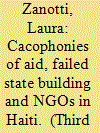

|
|
|
|
|
| Publication |
2010.
|
| Summary/Abstract |
The January 2010 earthquake in Haiti was a catastrophe not only for the loss of life it caused, but also because it destroyed the very thin layer of state administrative capacity that was in place in the country. This article argues that the fragility of the Haitian state institutions was exacerbated by international strategies that promoted NGOs as substitutes for the state. These strategies have generated a vicious circle that, while solving immediate logistical problems, ended up weakening Haiti's institutions. However, the article does not call for an overarching condemnation of NGOs. Instead, it explores two cases of community-based NGOs, Partners In Health and Fonkoze, that have contributed to creating durable social capital, generated employment and provided functioning services to the communities where they operated. The article shows that organisations that are financially independent and internationally connected, embrace a needs-based approach to their activities and share a long-term commitment to the communities within which they operate can contribute to bringing about substantial improvement for people living in situations of extreme poverty. It concludes that in the aftermath of a crisis of the dimension of the January earthquake it is crucial to channel support towards organisations that show this type of commitment.
|
|
|
|
|
|
|
|
|
|
|
|
|
|
|
|
| 2 |
ID:
072986
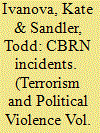

|
|
|
|
|
| Publication |
2006.
|
| Summary/Abstract |
This article investigates the relationship between regime characteristics and the likelihood of chemical, biological, radiological, and nuclear (CBRN) terrorist incidents. Odds ratios establish that democratic ideals-democratic rule, strong rule of law, and honest regimes-are associated with more CBRN incidents. Failed states may be where some terrorist groups form or take refuge, but these states have not been the venue of choice for CBRN incidents. Religious (cults and fundamentalists) and nationalist/separatist groups are not more likely than others to engage in CBRN attacks. To date, indiscriminate CBRN attacks are as likely as discriminate attacks to cause casualties. Transnational terrorist groups are less adept than others in concealing their acquisition of CBRN substances. For some regressions, democratic rule and strong rule of law are positive determinants of CBRN incidents.
|
|
|
|
|
|
|
|
|
|
|
|
|
|
|
|
| 3 |
ID:
141136
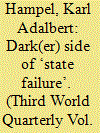

|
|
|
|
|
| Summary/Abstract |
Scholars concerned with the formation of states, specifically the relationship between state formation and war, hold one of two positions. Some agree with Charles Tilly’s historiological conclusion that war is decisive for the establishment of stateness and specify key concepts, in order to explain presumed discrepancies between past and present. Others point towards the international sphere in its current form and advocate a ‘war breaks states’ perspective. This paper argues that both standpoints neglect the ‘sub-national’ level. While proponents of the ‘war breaks states’ thesis are missing para-sovereign zones of rule, supporters of the ‘war makes states’ approach take a juridical view of statehood and focus on ‘state strength’. The failed states paradigm guiding contemporary security and development policy hinders an adequate analysis of the actual situation on the ground. Discussing the shortcomings of failed states approaches and state formation theorising, the paper proposes a conceptualisation in terms of socio-political variation instead of a mere dichotomisation of order. Some conclusive questions are raised, indicating future research directions linked to the historical sociology of state formation.
|
|
|
|
|
|
|
|
|
|
|
|
|
|
|
|
| 4 |
ID:
085266
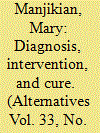

|
|
|
|
|
| Publication |
2008.
|
| Summary/Abstract |
Failed states discourse rests on an illness narrative. As the failing state battles against invasion by the terrorism "virus" the United State serves as physician, Diagnosing, trrating and sometime "curing" the patient.
|
|
|
|
|
|
|
|
|
|
|
|
|
|
|
|
| 5 |
ID:
105581
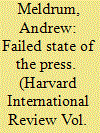

|
|
|
| 6 |
ID:
085184
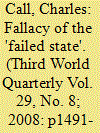

|
|
|
|
|
| Publication |
2008.
|
| Summary/Abstract |
This article examines the origins and evolution of the concepts of 'failed' and 'failing' states, arguing that the terms have come to be used in such widely divergent and problematic ways that they have lost any utility. The article details six serious problems with the term 'state failure' and related terms like 'fragile' or 'troubled' states, concluding that analysts should abandon these terms. It concludes with a modest attempt to develop alternative concepts and principles for thinking about diverse states that pose varied challenges for academic analysis and policy makers
|
|
|
|
|
|
|
|
|
|
|
|
|
|
|
|
| 7 |
ID:
098848


|
|
|
|
|
| Publication |
2010.
|
| Summary/Abstract |
This article engages with the latest (post-Cold War) debate about the theory and practice of nation building (state building). This is linked to a discussion of the shift in US foreign policy towards Afghanistan relative to Iraq between late 2008 and late 2009. Afghanistan is currently a major focus of nation building efforts and counter-insurgency programs led by the United States of America. Meanwhile, the discussion here ranges from South Vietnam to Colombia, Iraq and Afghanistan, and explores some of the ghosts that now haunt the US presence in Afghanistan 9 years on from the start Operation Enduring Freedom at the end of 2001. We argue that the possibility of successful nation building in Afghanistan is both far-fetched and far-off. In fact, what is required is the reorientation and reduction (even termination) of Washington and its allies' direct commitment to Kabul. Washington and its allies should focus on a grand strategy for the Middle East and Asia that attaches far less importance to Afghanistan. This should occur in the context of understanding the history of the emergence, universalization and contemporary crisis of the nation-state system. Nowhere are the limits of the nation-state system and the failure of nation building more apparent today than in Afghanistan. In this context a whole new approach to questions of war, peace and progress is in order. The comprehensive elaboration of a new security-development framework is beyond the scope of this article, but we conclude by elaborating some of the main elements of a new framework: this will include a point of departure for research and policy to move beyond the current crisis of the nation-state system and nation building.
|
|
|
|
|
|
|
|
|
|
|
|
|
|
|
|
| 8 |
ID:
110927
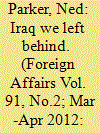

|
|
|
|
|
| Publication |
2012.
|
| Summary/Abstract |
Nine years after U.S. troops toppled Saddam Hussein and just a few months after the last U.S. soldier left Iraq, the country has become something close to a failed state. Prime Minister Nouri al-Maliki presides over a system rife with corruption and brutality, in which political leaders use security forces and militias to repress enemies and intimidate the general population. The law exists as a weapon to be wielded against rivals and to hide the misdeeds of allies. The dream of an Iraq governed by elected leaders answerable to the people is rapidly fading away.
|
|
|
|
|
|
|
|
|
|
|
|
|
|
|
|
| 9 |
ID:
164824
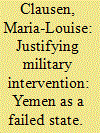

|
|
|
|
|
| Summary/Abstract |
The Saudi-led military intervention into Yemen began on 26 March 2015, and it has largely been supported by the international community despite resulting in the world’s largest current humanitarian disaster. The paper explores the emergence of the failed state concept, particularly as it has impacted the norm of sovereignty. It shows how being defined as a failed state can undermine the norm of sovereignty. This article argues that Saudi Arabia has utilised the failed state concept to legitimise its military intervention into Yemen by framing the intervention as necessary to establish a strong executive power and protect the Yemeni people.
|
|
|
|
|
|
|
|
|
|
|
|
|
|
|
|
| 10 |
ID:
088587
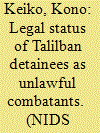

|
|
|
| 11 |
ID:
106727
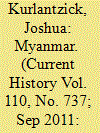

|
|
|
|
|
| Publication |
2011.
|
| Summary/Abstract |
China, other Asian nations, and the United States remain unprepared for Myanmar to spark a refugee crisis, a large-scale conflict along its borders-or even a nuclear breakout.
|
|
|
|
|
|
|
|
|
|
|
|
|
|
|
|
| 12 |
ID:
137576
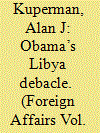

|
|
|
|
|
| Summary/Abstract |
On March 17, 2011, the UN Security Council passed Resolution 1973, spearheaded by the administration of U.S. President Barack Obama, authorizing military intervention in Libya. The goal, Obama explained, was to save the lives of peaceful, pro-democracy protesters who found themselves the target of a crackdown by Libyan dictator Muammar al-Qaddafi. Not only did Qaddafi endanger the momentum of the nascent Arab Spring, which had recently swept away authoritarian regimes in Tunisia and Egypt, but he also was poised to commit a bloodbath in the Libyan city where the uprising had started, said the president. “We knew that if we waited one more day, Benghazi—a city nearly the size of Charlotte—could suffer a massacre that would have reverberated across the region and stained the conscience of the world,” Obama declared. Two days after the UN authorization, the United States and other NATO countries established a no-fly zone throughout Libya and started bombing Qaddafi’s forces. Seven months later, in October 2011, after an extended military campaign with sustained Western support, rebel forces conquered the country and shot Qaddafi dead.
|
|
|
|
|
|
|
|
|
|
|
|
|
|
|
|
| 13 |
ID:
163479
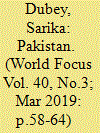

|
|
|
|
|
| Summary/Abstract |
This is a welcome step taken by Pakistan’s Supreme Court. There is an urgent need to strengthen constitutional bodies and political institutions to work freely. Role of military in the state affairs should be diminished. Several experts were of the view that Pakistan’s Prime Minister Imran Khan was supported by the country’s Army in the last year’s general election.
|
|
|
|
|
|
|
|
|
|
|
|
|
|
|
|
| 14 |
ID:
151821
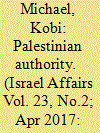

|
|
|
|
|
| Summary/Abstract |
Despite the vast resources poured by the international community into the construction of Palestinian institutions, the PA has failed to build and maintain the infrastructures required for the establishment of a vital, democratic and functioning state. By most common parameters, the PA is a failed entity. Taking into account this experience and the consequences of the last six years of Arab upheavals, characterized by the increasing phenomenon of failed states, there is a need for a paradigm shift that will increase the likelihood of a functioning Palestinian state after a peace agreement with Israel is signed and reduce the risk of its being a failed state that would pose a complex, dangerous challenge for Israel and the neighbouring Arab states.
|
|
|
|
|
|
|
|
|
|
|
|
|
|
|
|
| 15 |
ID:
154472
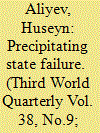

|
|
|
|
|
| Summary/Abstract |
This article examines whether the incidence of civil wars and the presence of violent non-state actors have an effect on state failure. Research on failed states has thus far prioritised armed conflicts as one of the key causes of state failure. This study challenges that claim and posits that civil war incidence has limited impact on the transition from fragility to failure. Global quantitative analysis of state failure processes from 1995 to 2014 shows that although armed conflicts are widespread in failed states, civil violence does not lead to state failure and large numbers of failed states become engulfed by civil war only after the failure occurs. By contrast, this study demonstrates a direct link between the presence of violent non-state actors and state failure.
|
|
|
|
|
|
|
|
|
|
|
|
|
|
|
|
| 16 |
ID:
119957
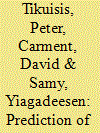

|
|
|
|
|
| Publication |
2013.
|
| Summary/Abstract |
The primary objective of this article is to advance the development of early warning of intrastate conflict by combining country-level structural and events data in a logistic regression model calibrated and validated using split-sample cases. Intrastate conflict is defined by the occurrence of one or more highly destabilizing events collectively termed a crisis of interest (COI). Two separate two-year periods between 1990 and 2005 were examined in twenty-five globally dispersed countries. COIs occurred in about 6 percent of all the half-monthly periods examined. While model accuracy (total correct predictions of COI and non-COI) usually exceeded 90 percent, the model did not generate sufficiently high and consistent precision (correct number of COI over total predicted) and recall (correct number of COI over total observed) for practical use.
|
|
|
|
|
|
|
|
|
|
|
|
|
|
|
|
| 17 |
ID:
103715
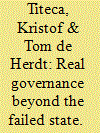

|
|
|
|
|
| Publication |
2011.
|
| Summary/Abstract |
n the Democratic Republic of Congo (DRC), the state administration has retreated from much of the public domain. The specific case of the education sector - a domain traditionally reserved for the state - shows how public services continue to be provided, and how the Congolese state continues to survive and transform itself. Although no overall power governs the system - there is no overall regulatory authority - this does not mean that the education sector is ungoverned. The state survives as an administrative framework whose role in providing public services has been redefined rather than evaporated. This article describes the organization of the educational system as the direct result of an evolving negotiation process between state and non-state actors. It shows how this negotiated nature of statehood, and the power differentials between the various actors, involve constant renegotiation. Instead of producing uniform results within the education sector, this form of regulation depends on power configurations in particular localities at particular times.
|
|
|
|
|
|
|
|
|
|
|
|
|
|
|
|
| 18 |
ID:
093153
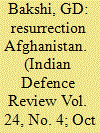

|
|
|
| 19 |
ID:
093570
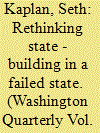

|
|
|
| 20 |
ID:
113126
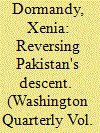

|
|
|
|
|
|
|
|